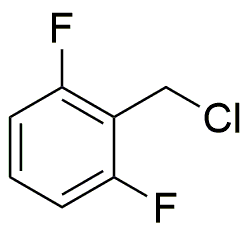2,6-Difluorobenzyl chloride is widely utilized in research focused on:
- Synthesis of Pharmaceuticals: This compound serves as a key intermediate in the production of various pharmaceuticals, particularly those that require fluorinated aromatic compounds to enhance biological activity.
- Agrochemical Development: It is used in the synthesis of agrochemicals, including pesticides and herbicides, where its fluorine atoms can improve efficacy and stability in agricultural applications.
- Material Science: The compound is employed in the development of advanced materials, such as polymers and coatings, that benefit from its unique chemical properties, leading to improved durability and resistance to environmental factors.
- Research in Organic Chemistry: As a versatile building block, it is often utilized in organic synthesis to create complex molecules, making it invaluable for chemists working on innovative compounds.
- Fluorine Chemistry Studies: Its distinct fluorinated structure makes it an important subject in studies aimed at understanding the effects of fluorination on chemical reactivity and stability, providing insights that can be applied across various fields.
General Information
Properties
Safety and Regulations
Applications
2,6-Difluorobenzyl chloride is widely utilized in research focused on:
- Synthesis of Pharmaceuticals: This compound serves as a key intermediate in the production of various pharmaceuticals, particularly those that require fluorinated aromatic compounds to enhance biological activity.
- Agrochemical Development: It is used in the synthesis of agrochemicals, including pesticides and herbicides, where its fluorine atoms can improve efficacy and stability in agricultural applications.
- Material Science: The compound is employed in the development of advanced materials, such as polymers and coatings, that benefit from its unique chemical properties, leading to improved durability and resistance to environmental factors.
- Research in Organic Chemistry: As a versatile building block, it is often utilized in organic synthesis to create complex molecules, making it invaluable for chemists working on innovative compounds.
- Fluorine Chemistry Studies: Its distinct fluorinated structure makes it an important subject in studies aimed at understanding the effects of fluorination on chemical reactivity and stability, providing insights that can be applied across various fields.
Documents
Safety Data Sheets (SDS)
The SDS provides comprehensive safety information on handling, storage, and disposal of the product.
Product Specification (PS)
The PS provides a comprehensive breakdown of the product’s properties, including chemical composition, physical state, purity, and storage requirements. It also details acceptable quality ranges and the product's intended applications.
Certificates of Analysis (COA)
Search for Certificates of Analysis (COA) by entering the products Lot Number. Lot and Batch Numbers can be found on a product’s label following the words ‘Lot’ or ‘Batch’.
Número de catálogo
Número de lote/lote
Certificates Of Origin (COO)
This COO confirms the country where the product was manufactured, and also details the materials and components used in it and whether it is derived from natural, synthetic, or other specific sources. This certificate may be required for customs, trade, and regulatory compliance.
Número de catálogo
Número de lote/lote
Safety Data Sheets (SDS)
The SDS provides comprehensive safety information on handling, storage, and disposal of the product.
DownloadProduct Specification (PS)
The PS provides a comprehensive breakdown of the product’s properties, including chemical composition, physical state, purity, and storage requirements. It also details acceptable quality ranges and the product's intended applications.
DownloadCertificates of Analysis (COA)
Search for Certificates of Analysis (COA) by entering the products Lot Number. Lot and Batch Numbers can be found on a product’s label following the words ‘Lot’ or ‘Batch’.
Número de catálogo
Número de lote/lote
Certificates Of Origin (COO)
This COO confirms the country where the product was manufactured, and also details the materials and components used in it and whether it is derived from natural, synthetic, or other specific sources. This certificate may be required for customs, trade, and regulatory compliance.


